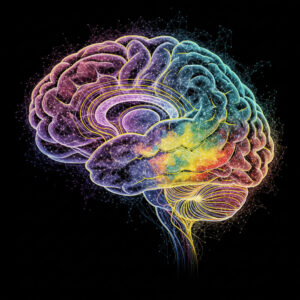I believed, like so many others, that one of the core ‘signs’ of autism was a lack of empathy. It’s an old myth, a persistent one. For years, it was a barrier to my self-understanding. If I felt a lump in my throat during a particularly moving John Lewis Christmas ad, well, that was proof, wasn’t it? I couldn’t possibly be on the spectrum. I feel things. A lot! Autistic empathy is interesting.
How wrong I was. My journey to a late diagnosis has been one of unpicking these long-held ‘truths’ and replacing them with a kinder, more complex, and more accurate reality. I now see the autism spectrum less as a rigid, linear scale from ‘not very’ to ‘very’ autistic, and more like a beautiful colour wheel —a circle of vibrant, overlapping hues where we all have our own unique palette of strengths and challenges. And for me, a huge, brilliant splash of colour on that wheel is, without a doubt, empathy.
The Great British Bake Off and the Empathy Overload
I’d go so far as to say that sometimes, I have too much empathy. It’s a strange thing to admit when the world thinks the opposite of you. I’m intensely conscious of the emotional weather in a room. I can feel the change in atmospheric pressure after an argument, a silent tension that hangs in the air, thick and suffocating.
And TV shows? Forget about it. They will make me cry with alarming ease. It’s not just the heavy dramas, either. I’m talking about a perfect showstopper on The Great British Bake Off, a moving backstory on a reality show, or yes, even a well-crafted advert. There’s something about being in that passive but focused state, with the lights down low, that seems to open the floodgates. My emotional defences are down, and everything just… pours in.

This isn’t a failing; it’s a feature of our wiring. For some of us, this is what’s known as hyper-empathy—an intense, sometimes overwhelming, affective empathy. Affective empathy is that gut-punch feeling, the ability to physically feel what someone else is feeling. It’s why my heart genuinely aches when I see someone in distress, be it on a screen or in real life.
The problem is, that this deluge of feeling isn’t always easy to manage. Combine it with a dash of rejection-sensitive dysphoria (RSD)—that profound fear of perceived rejection—and a natural tendency to ruminate, and my brain can take a worrying leap. The empathy that feels the room’s tension suddenly becomes a detective, desperately trying to solve a crime. The prime suspect? Me. The thought process spirals from ‘Something feels off’ to ‘What have I done to upset them?’ in a heartbeat. In those moments, my empathy isn’t a gift; it feels like a curse.
A Different Wiring, Not a Faulty One
So, what’s actually happening here? Why can we feel so much, yet be perceived as feeling so little?
This is where the Double Empathy Problem comes in. The theory, proposed by Dr Damian Milton, suggests that empathy isn’t a one-way street. The issue isn’t a deficit in the autistic person, but a mutual breakdown of understanding between people with very different ways of experiencing and communicating their inner worlds. Our neurotypical peers struggle to read our signals just as much as we sometimes struggle to read theirs.
It perfectly explains that awful, frozen feeling. My empathy extends so powerfully to others, and to animals, too. I can almost feel their joy, excitement, or wonder as if it were my own—and it’s a truly wonderful thing. But when it’s sadness, fear, or emotional pain, it’s a whole other ball game. I might feel that sadness with every fibre of my being. However, I won’t always express that in a way that is typical or in a way the neurotypical world expects.
This is the gap between affective empathy (feeling the feeling) and cognitive empathy (understanding and responding to it in a ‘typical’ way). I can feel it all, but I genuinely just don’t know how to act in that moment. Of course, my brain will kindly replay the scene for me later, usually at 3 AM, providing a full and detailed report on all the things I should have said or done.
Understanding this; explains so much. This is me. My brain physically works differently. It’s not designed to perform empathy in the same way a neurotypical brain is; research even suggests we use different neural pathways to process social information. So why on earth would my empathy look the same on the outside?

The Compass of My Convictions
Embracing this reality hasn’t just helped me understand myself; it’s helped me understand my place in the world. I truly believe that this powerful, sometimes painful, sense of empathy is the engine that powers my sense of justice. It’s a massive part of my identity.

It’s the compassionate ache that fuels my veganism—a refusal to participate in a system that causes fear and suffering to animals I empathise with so deeply. It’s the protective fire that informs my identity as a gay man and my role as a fierce ally to anyone in the LGBTQIA+ community and beyond who is treated unfairly in this often unkind world. As a parent to two wonderful dual-heritage children, it’s the force that drives me to build a home where fairness, understanding, and celebrating differences are the cornerstones of our family.
I am proud of that. I wouldn’t want to be without my strong beliefs, because they are at the very core of who I am. My empathy, in all its intense, awkward, and overwhelming glory, is not a bug. It’s the feature that points my moral compass true north. It’s not a lack; it’s an abundance. And finally, I’m learning to see it for the gift it truly is.

Leave a Reply